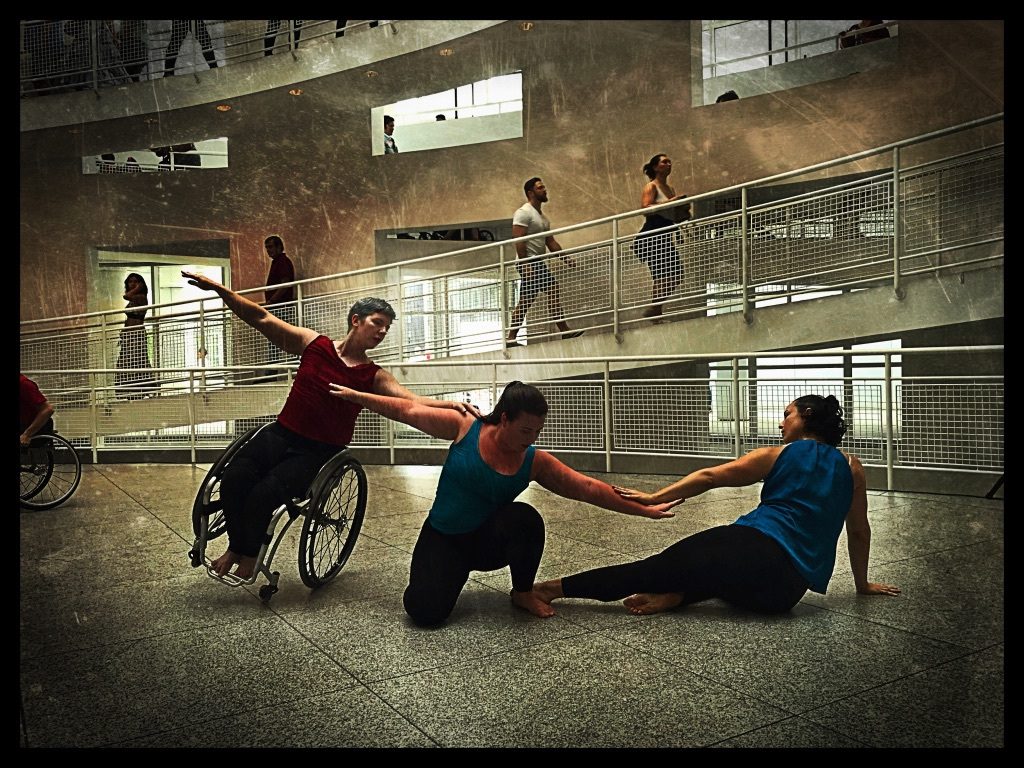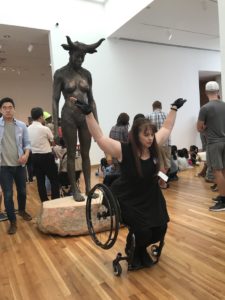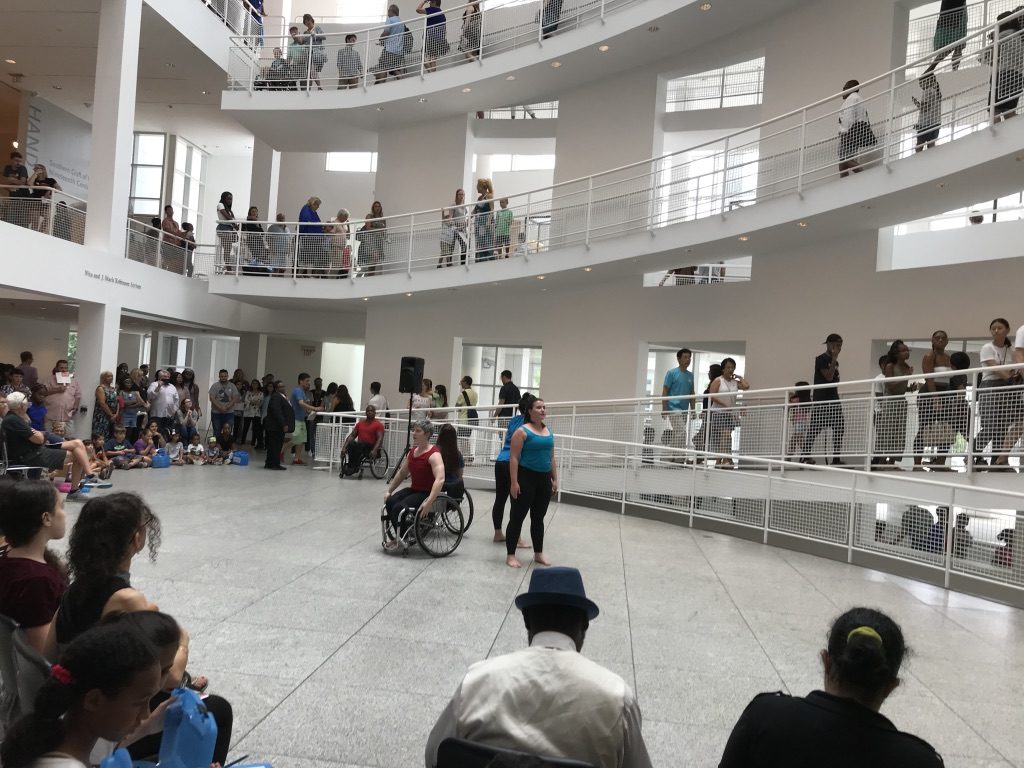The human body is largely the same from one person to the next. Collectively, bones develop to form a skeletal structure absent of subjectivity. Muscles originate from one area of the body and insert onto another, creating a distinct and purposeful path for movement. The circulatory and nervous systems travel like a network of rivers, giving life to our deepest and most hidden structures. The human body is often visualized in this sameness, and anatomy textbooks have defined it from this objective viewpoint for obvious and well-intended purposes.
However, previous theoretical and humanities-driven work tells us that the body as a whole is much more complex and unique.1 Bones, muscles, arteries, veins, and nerves are found in all of us and act as the foundation for where our bodies and our stories begin. However, defying all logic, the human body courses through life resulting in something that is much greater than the sum of its original parts. It becomes a representation of its collective past and individual experiences—a story that requires deeper understanding and cannot be told in the pages of an anatomy textbook.1
Conceptualizing bodies as both collectively the same yet subjectively unique can be challenging. The history of art provides an effective way to explore the objective and subjective description of bodies; analysis of art provides rehabilitation professionals the opportunity to deepen their understanding and insight into the untold stories of their patients.
Understanding that human bodies are more complex than their individual parts teased out in terms of pain, range of motion, and strength during an exam is crucial for a Doctor of Physical Therapy student working with patients. Throughout my education I have sought opportunities that allow me to further explore these theoretical concepts about the body—how it’s perceived, how it’s felt and experienced by the person who inhabits it, and what makes it unique. Taking time to critically examine art from these different perspectives has improved my understanding of the complexities of the human body.
Disability Represented in Art
In Spring 2018, I had the opportunity to participate in a novel pilot program that brought together dancers, art historians, disability studies scholars, educators, and students in an effort to expand the lenses through which art is perceived. Through critical evaluation and historical research of visual artwork, this collaboration aimed to explore how disability is represented in art, challenge traditional perspectives of movement and disability, and spark dialogue about the representation of bodies in art.
Full Radius Dance (FRD), a physically integrated dance company based in Atlanta, Georgia, was the driving force behind this initiative. FRD seeks to re-write the script when it comes to movement, dance, and disability. By merging disabled and non-disabled bodies in their performances, FRD is fundamentally changing the dialogue around and about disabled artists and performers.
This pilot program uniquely blended the visual arts evaluated at the High Museum of Art in Atlanta with the physically-integrated dance performances of FRD. Pieces of visual art, such as those by Jean-Michel Basquiat (1960-1988), were evaluated from a disability studies perspective. FRD used these evaluations to inform choreography performed among the artwork at the museum (Figure 1). Working in synchrony with the visual artworks evaluated, this performance offered an invitation into the disability-experience culture and an opportunity to listen to and engage with the story they were telling.
My experience with this interdisciplinary pilot program serves as the background for the development of this article. Using Basquiat’s artwork as an example to better understand the subjective nature of the body, in concert with the performance by FRD and their commitment to redefining how bodies are represented in art, I aim to explore how the narrative held within our bodies unfolds. Finally, by linking these concepts to my experience as a Doctor of Physical Therapy student, I hope to create meaningful clinical applications for how clinicians can recognize and listen to the untold stories of their patients.
 Figure 1. Three dancers from Full Radius Dance are captured in mid-performance at the High Museum of Art in Atlanta, Georgia. Their arms are outstretched wide and rest on one another, creating a delicate horizontal line connecting their movements. The dancer on the far left is in a wheelchair with the right wheel slightly lifted off the ground, suspending body and metal together in space. The dancer in the middle is half-kneeling, her body weight shifted directionally toward the right, while the dancer on the far right is propped on her right arm with her back toward the camera, her gaze toward the left. Museum visitors walk in the background. This extraordinary moment depicts in real time how movement is a human experience always in flux.
Figure 1. Three dancers from Full Radius Dance are captured in mid-performance at the High Museum of Art in Atlanta, Georgia. Their arms are outstretched wide and rest on one another, creating a delicate horizontal line connecting their movements. The dancer on the far left is in a wheelchair with the right wheel slightly lifted off the ground, suspending body and metal together in space. The dancer in the middle is half-kneeling, her body weight shifted directionally toward the right, while the dancer on the far right is propped on her right arm with her back toward the camera, her gaze toward the left. Museum visitors walk in the background. This extraordinary moment depicts in real time how movement is a human experience always in flux.
The Appeal of Basquiat
When critically evaluating pieces of visual art at the High Museum using a disability studies lens, I quickly realized the value of Basquiat’s work. I discovered how Basquiat skillfully depicts the human body and encapsulates it with symbolism and text to form a type of visual language, telling his story—and that of many others. At its very core, Basquiat’s work awakens the realization that our bodies and the stories they tell are conceived in sameness yet fueled by our personal histories.
Basquiat’s knowledge and use of anatomy have been explored to a great extent in previous literature—specifically, how he embodied his cultural background and experience as a young black artist.2
I have found Basquiat’s art to be significant in the context of pain and disability; his images can be used as powerful tools for rehabilitation professionals seeking insight and perspective into the complex and layered nature of one’s identity. Biological form alone is only one small piece of a person’s story. History, heritage, and experiences all merge together in unity with our anatomical bodies to form a type of hidden and unspoken personal narrative, shaping how we live in and experience the world around us. Basquiat encourages—and at times, forces—viewers to confront the reality of his story while urging us to consider the complexity of our own.
Looking at Basquiat’s paintings can be like looking into an unknown galaxy. There’s a sense of both fear and excitement as you try to make sense of and rationalize the shapes, colors, lines, words, and symbols sprawled across the canvas. This is the backdrop for the visual language and storytelling Basquiat created. Layers of bright color that uninhibitedly fill space, lines with no real origin, symbols and text written down and crossed out, just to be written over again. Basquiat’s art, much like ourselves, is complex and dynamic. Yet, the way he merged text and symbols provides a roadmap of sorts to the story Basquiat is telling about the world around us; they can be important indicators of the lives of the oppressed. Much like Basquiat himself, straddling two distinct worlds—one of fame and fortune and the other of injustice and racism—his art created space for black bodies and black stories during the 1980’s when the art world was dominated by white, upper-class artists.2,3
Basquiat and the Body
The anatomical drawings and references commonly found in Basquiat’s art—and one of the reasons his art is so applicable to rehabilitation professionals—was largely influenced by a gift from his mother.4,5
In the summer of 1968, Basquiat was playing outside his Brooklyn home when he was hit by an oncoming car.5 He survived multiple fractures and internal injuries and was hospitalized for more than a month, enduring multiple surgeries.5,6 During this time, Basquiat’s mother gifted him a Gray’s Anatomy textbook in the hope that it would help him better understand his injuries and what was happening to his body.5,6 This textbook appeared to have a lasting impact on Basquiat’s artistic career, as he frequently depicted both realistic and abstract anatomical drawings that served as integral components of his visual language.3
In homage to the anatomical human body, Basquiat often drew inspiration from the work of Leonardo da Vinci.6,7 Many of Basquiat’s paintings seem to reference Leonardo’s detailed and precise anatomical drawings and appear to provide insight into Basquiat’s knowledge and appreciation of the human form.
Moving beyond his more realistic anatomical drawings, Basquiat began to explore the human body in more loosely defined terms, allowing space for further interpretation of his work. In Back of the Neck (1983), Basquiat continued to portray a fragmented body like those found in his da Vinci-inspired studies; but this time, the margins aren’t quite as clear. Unlike the da Vinci-inspired pieces, the representation of the human body in Back of the Neck is less direct and calls for deeper analysis of the text and symbolism to identify the story Basquiat is trying to tell. The namesake of the piece alone, Back of the Neck, may indicate a type of vulnerability Basquiat feels to the way his story is being told. For example, despite his reputable status in the art world, he remains vulnerable to the injustices often experienced by black men and may fear he will be known more for the color of his skin and not his artistic talents.8 This type of dichotomy plays out in many of Basquiat’s pieces and can be used as a means to explore the multiple perspectives of a person’s story.
In comparison to Basquiat’s more abstract renditions of the human body, FRD takes a similar approach to choreography and dance, often blurring the lines between the expected and unexpected, the disabled and non-disabled, and traditional ideas about movement (Fig. 2, Fig. 3). By featuring physically integrated choreography, FRD is redefining the meaning of movement and highlighting the work and talents of disabled artists. Additionally, the dancers of FRD appear to embrace their experience—and perhaps the vulnerability that comes with it—as disabled individuals and disabled artists. Basquiat’s visual artworks and the FRD performance both work to confront the duality of a lived experience while challenging societal norms about who can create and experience art.
 Figure 2. The dancers in this image adopt a chaotic vertical formation that captures various forms of movement as some dancers are in wheelchairs and others are not. At the top of the formation is a dancer proudly holding a wheelchair wheel in her right hand, illustrating the deep embodiment of metal and flesh. A group of museum visitors walk up and down the switch-back style ramp in the immediate background. A little boy, almost out of frame, gazes back toward the performers. The multiplicity of movements forms a fluid visual tapestry.
Figure 2. The dancers in this image adopt a chaotic vertical formation that captures various forms of movement as some dancers are in wheelchairs and others are not. At the top of the formation is a dancer proudly holding a wheelchair wheel in her right hand, illustrating the deep embodiment of metal and flesh. A group of museum visitors walk up and down the switch-back style ramp in the immediate background. A little boy, almost out of frame, gazes back toward the performers. The multiplicity of movements forms a fluid visual tapestry.
 Figure 3. The dancer in this image adopts a posture that mirrors the 8-foot-tall bronze sculpture, “Minotarus” by Nandipha Mntambo, which stands behind her. The dancer’s wheelchair is tipped forward, her arms are lifted high above her head with her fingertips pointing outward; her gaze is strong and steady toward the ground. Much like the sculpture she stands in front of, the dancer’s pose challenges our understanding of the human form and empowers us all to explore the ambiguous parts of our physical selves.
Figure 3. The dancer in this image adopts a posture that mirrors the 8-foot-tall bronze sculpture, “Minotarus” by Nandipha Mntambo, which stands behind her. The dancer’s wheelchair is tipped forward, her arms are lifted high above her head with her fingertips pointing outward; her gaze is strong and steady toward the ground. Much like the sculpture she stands in front of, the dancer’s pose challenges our understanding of the human form and empowers us all to explore the ambiguous parts of our physical selves.
Clinical Note: Rehabilitation professionals can use these dichotomous narratives to understand how a patient may present objectively strong and healthy, yet under the surface be feeling the exact opposite. Being in tune with the duality of a person’s experience can inform our decision-making process and create new avenues to promote healing.
Basquiat and the Narrative
From an early age, Basquiat used words and phrases just as much as lines and colors to express himself and analyze the world around him. After dropping out of high school at the age of 15 and leaving the comfort of his home for the streets of lower Manhattan, Basquiat quickly learned about the injustices of the world and his place in it as a young black artist.5
Like today’s mysterious Banksy, Basquiat began his prolific career in 1977 anonymously under the pseudonym, SAMO©.3-6,9 Partnering with a friend, Basquiat wrote cryptic and philosophical messages around the city that challenged traditional thought on race and culture. Basquiat was turning the world of graffiti on its head—and people began to notice. The work of SAMO© commanded the attention of both the general public and the New York City art scene to the stark realities of the world around them. Basquiat was an expert at making people comfortably uncomfortable by challenging traditional thinking and bringing context and depth to conversations about race, religion, and culture. The narrative talents of Basquiat, modeled through the work of SAMO©, is an important reminder of how his targeted use of text had the ability to describe deeply-rooted and complex social issues.
Running in a similar vein, performances by FRD work to challenge societal norms about dance, art, and disability. By integrating the metal and carbon fiber frame of a wheelchair into modern dance techniques, FRD is offering an opportunity for us to more deeply consider the meaning of movement and the story that movement tells. With long-established attitudes and beliefs about disability and the societal boundaries that have limited the spaces where people with disabilities can share their story, FRD is creating a path where these narratives can be heard and shared (Fig. 4).

Figure 4. In this image, four dancers form a small, quiet circle, their backs to one another as they face out into the crowd. Their arms are strongly held next to their bodies. The formation showcases the integrated nature of the dancers, two of whom are in wheelchairs while the other two are standing. The stillness of their small circle becomes even more evident as you notice the large crowd of museum visitors forming around them. Many are sitting on the ground and watching, while others pass by without notice – a common experience when living with a disability in a society that often overlooks your capabilities and human connectedness. But this image, frozen in space, surrounded by movement and varying postures, connects all the bodies present in time.
Clinical Note: For students, educators, and clinicians working in the field of rehabilitation, Basquiat’s art and the work of FRD are valuable resources to help us better understand the complexities of the human body, and how our physical bodies hold unique and untold personal narratives. By acknowledging the human experience as it is and listening to these untold stories, rehabilitation clinicians will be better equipped to provide compassionate and healing care.
An Innovative Disability Perspective
Rehabilitation professionals, students, patients, and caregivers who are dedicated to approaching healing from a humanistic perspective must gain a clearer understanding of disability studies. Basquiat’s work and the work of FRD challenges us to open our eyes to the many layers of the objective and subjective body, to consider how identities are formed through a collage of experiences, and to view the body as a piece of that story. Unlike the performances by FRD, Basquiat’s art is not explicitly tied to those with disabilities. The connections, however, remain relevant and, for the most part, are largely untapped within the health humanities literature.
One of Basquiat’s works in particular, Untitled (Cadmium), was evaluated by the FRD program from a disability studies perspective. In the piece, Basquiat surrounds a black male body with strong personal symbolism of his cultural and religious identity.2 The body itself appears to have scars and the face has eyes and a mouth painted white. For me, this piece is indicative of the level of awareness Basquiat had about his own body and story, and the bodies and stories of those who walked before him. It represents Basquiat’s unbridled talent for merging the anatomical body and the narrative body together into one, much like how FRD merges disabled and non-disabled bodies into one beautiful, storied movement.
For rehabilitation professionals, observing the body in its anatomical form is a common practice used to assess, identify, and treat regions of pain or weakness. It is understood, however, that the pain often experienced by patients can be rooted more deeply than in the anatomical structures themselves. It is here where our standard practice of observation becomes more complex, relying on alternative methods to come up with effective solutions for our patients.
Clinical Note: Basquiat’s use of the human body in his art, paired with the way FRD portrays movement, runs parallel to that of how rehabilitation professionals observe the body in practice. Basquiat produces art that skillfully layers both the seen and unseen aspects of the human body, while FRD layers choreographed movements with flesh and metal. When working with patients, there is a layered nature to both pain and disability. These layers tell a story about the body that is unique to the individual and informed by their personal histories and experiences. Through observation and analysis of Basquiat’s work and FRD’s performances, we slowly become awakened to the story being told within our own bodies and the bodies of those around us.



 Figure 2. The dancers in this image adopt a chaotic vertical formation that captures various forms of movement as some dancers are in wheelchairs and others are not. At the top of the formation is a dancer proudly holding a wheelchair wheel in her right hand, illustrating the deep embodiment of metal and flesh. A group of museum visitors walk up and down the switch-back style ramp in the immediate background. A little boy, almost out of frame, gazes back toward the performers. The multiplicity of movements forms a fluid visual tapestry.
Figure 2. The dancers in this image adopt a chaotic vertical formation that captures various forms of movement as some dancers are in wheelchairs and others are not. At the top of the formation is a dancer proudly holding a wheelchair wheel in her right hand, illustrating the deep embodiment of metal and flesh. A group of museum visitors walk up and down the switch-back style ramp in the immediate background. A little boy, almost out of frame, gazes back toward the performers. The multiplicity of movements forms a fluid visual tapestry.
 Figure 3. The dancer in this image adopts a posture that mirrors the 8-foot-tall bronze sculpture, “Minotarus” by Nandipha Mntambo, which stands behind her. The dancer’s wheelchair is tipped forward, her arms are lifted high above her head with her fingertips pointing outward; her gaze is strong and steady toward the ground. Much like the sculpture she stands in front of, the dancer’s pose challenges our understanding of the human form and empowers us all to explore the ambiguous parts of our physical selves.
Figure 3. The dancer in this image adopts a posture that mirrors the 8-foot-tall bronze sculpture, “Minotarus” by Nandipha Mntambo, which stands behind her. The dancer’s wheelchair is tipped forward, her arms are lifted high above her head with her fingertips pointing outward; her gaze is strong and steady toward the ground. Much like the sculpture she stands in front of, the dancer’s pose challenges our understanding of the human form and empowers us all to explore the ambiguous parts of our physical selves.


 Member since 2019 | JM14274
Member since 2019 | JM14274


NO COMMENT